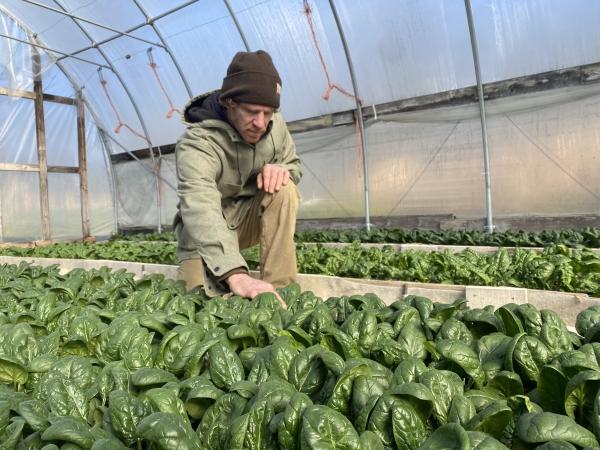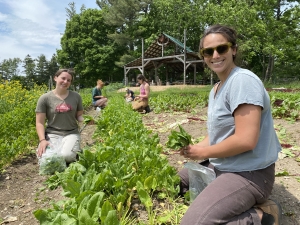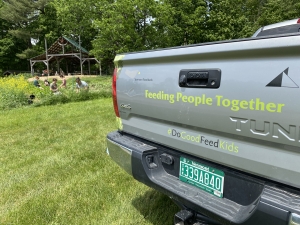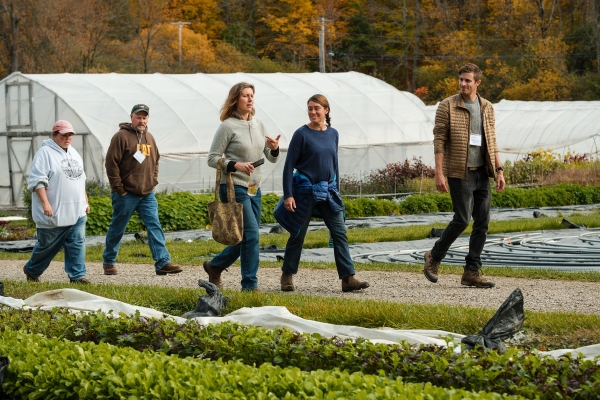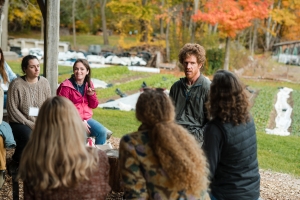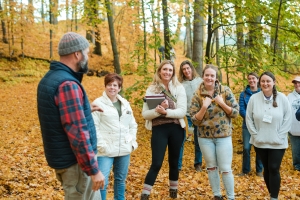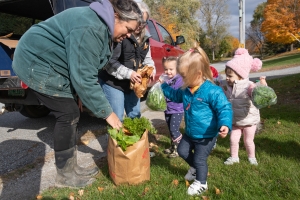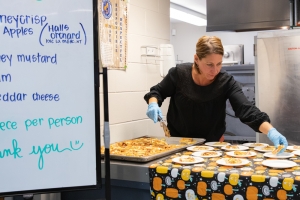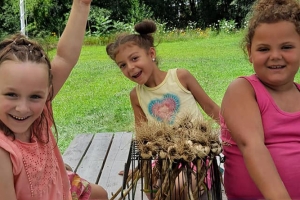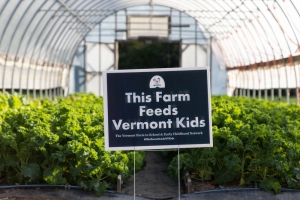Over the years I've witnessed an amazing transformation to the Market Garden. From a once sleepy garden almost hidden from passersby, Josh came on board and saw its tremendous potential to not only supply the Inn with delicious and sustainable fruits and vegetables but feed our schools and their communities as well. He turned the Market Garden into a veritable outdoor classroom for anyone -of any age- who desires to learn environmentally sustainable, flourishing, and nutritious health-based gardening. The vegetables and the fruits and the flowers grown by Josh and his team at the Market Garden coincide with nature's laws of order, beauty, and of Life-giving force.
Farmer-Community Connections
As we celebrate the harvest season, we share our gratitude to all the farmers—including our own—who are building more sustainable food systems, and strengthening ties to their communities to help create a healthier future for all. Here are a few initiatives that were involved in:
Market Garden Helping to Feed Our Community
Kale, beans, basil, eggplant, lettuce, even tomatillos! Gleaners harvested a lot of different produce from our Market Garden fields this season. Why these particular crops? The reasons vary. Some crops are super productive (think basil), some have a limited shelf life (green beans), and sometimes menus simply shift at the Inn, the primary destination for our produce (the eggplant that didn’t become baba ganoush).
The ebb and flow of growing crops means that gleaning isn’t a science, but it is a commitment. Every two weeks this summer, Josh welcomed a team of gleaners from Vermont Foodbank. He’d share what crops were available ahead of time, and they’d arrive ready to harvest. “They’re great to work with because they know their clients–they know the specific produce needs at their partner sites,” Josh explains. The Shelburne Food Shelf has been on the same biweekly schedule (continuing through the winter), only we bring the produce to them. A volunteer delivers produce harvested and packed by our team, then returns with intel from the food shelf staff: “The kale was really popular!” or “No more cabbage.” That liaison role is critical. It helps us match crop availability with the need, ensuring that fresh produce gets eaten, not wasted.
And that’s the goal. “It’s super important to normalize people getting something fresh and nutritious from the local food shelf–food that can connect them to their community.” Josh says, “It’s how we grow our community to be healthy, and help get kids to school without being hungry. I’m happy to be a part of that.”
Learning the ABCs of Farm-Based Education
On a late October afternoon, surrounded by brilliant foliage in our Market Garden, twenty farmers met the Fabulous Five. The Fabulous Five, of course, are the five essential elements plants need in balance to grow: sun, water, air, space, and soil. This “Fab 5” scavenger hunt was among the hands-on activities shared in the annual workshop ABCs of Farm-Based Education. Across three days, workshop attendees – farmers, farm-based educators, and non-formal educators – learned on Shelburne Farms’ campus. From the Market Garden and Sugar House to the Children’s Farmyard and Outdoor Classroom, farmers gained inspiration for ways they might work with local schools or safely weave education into their own production spaces. In the words of agricultural educator Lilly, the workshop “fed my spark.”
Farms and gardens have a vital role to play in connecting learners of all ages to where their food and fiber comes from, and in examining the complexities of our food and agricultural systems to ultimately inform more sustainable and just decisions in the future. “A moment that was powerful for me was the lens of the Big Ideas of Sustainability,” shared farm-based educator Kendra. “I’m now looking for more opportunities about teaching sustainability.” Read more about the work of the Farm-Based Education Network in this recent blog post.
Interested in joining us for the next session of ABCs in Spring 2023? Sign up to be notified when registration opens.
Vermont Farms Feeding Vermont Kids
We often call the cafeteria the biggest classroom in the school, and the farm to school movement is pushing the idea further every year here in Vermont. Our schools spend over $15 million on food every year, and over 100 Vermont farms feed our youth across the state through early childhood programs and school nutrition programs. How can more of that investment support more of our farmers?
The Vermont Farm to School & Early Childhood Network — facilitated by Vermont FEED, our partnership project with NOFA-VT — advocated for and helped to create a state Local Foods Incentive, which offers districts and supervisory unions financial incentive for purchasing local food for their school meals. Additionally, grants through the Vermont Agency of Agriculture, Food & Markets have supported early childhood programs in purchasing CSAs from local farms, getting farm-fresh produce on the plates of our youngest learners.
To celebrate these wins, the Network launched the This Farm Feeds Vermont Kids project. Educators, farmers, and school nutrition professionals shared their stories about how their farmer-school partnership is impacting their school communities for the better. Click the images below to read more:
